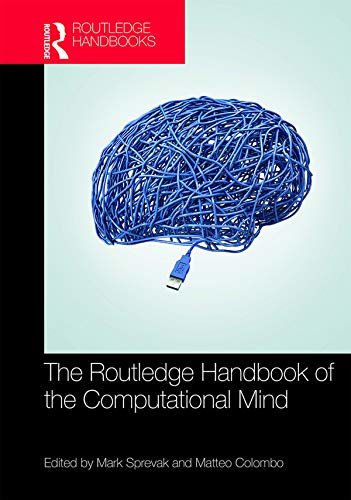
The Routledge Handbook of the Computational Mind (Routledge Handbooks in Philosophy) (English Edition)
- 作者
- Mark Sprevak、Matteo Colombo
- 语言
- 英语
- 出版社
- Routledge
- 出版日期
- 2018年9月13日
- 纸书页数
- 526页
- 电子书格式
- epub,pdf,mobi,azw3,txt,fb2,djvu
- 文件大小
- 2714 KB
- 下载次数
- 7172
- 更新日期
- 2023-07-25
- 运行环境
- PC/Windows/Linux/Mac/IOS/iPhone/iPad/iBooks/Kindle/Android/安卓/平板
内容简介
Computational approaches dominate contemporary cognitive science, promising a unified, scientific explanation of how the mind works. However, computational approaches raise major philosophical and scientific questions. In what sense is the mind computational? How do computational approaches explain perception, learning, and decision making? What kinds of challenges should computational approaches overcome to advance our understanding of mind, brain, and behaviour?
The Routledge Handbook of the Computational Mind is an outstanding overview and exploration of these issues and the first philosophical collection of its kind. Comprising thirty-five chapters by an international team of contributors from different disciplines, the Handbook is organised into four parts:
History and future prospects of computational approaches
Types of computational approach
Foundations and challenges of computational approaches
Applications to specific parts of psychology.
Essential reading for students and researchers in philosophy of mind, philosophy of psychology, and philosophy of science, The Routledge Handbook of the Computational Mind will also be of interest to those studying computational models in related subjects such as psychology, neuroscience, and computer science.
The Routledge Handbook of the Computational Mind (Routledge Handbooks in Philosophy) (English Edition) EPUB, PDF, MOBI, AZW3, TXT, FB2, DjVu, Kindle电子书免费下载。
- The Feminine Case: Jung, Aesthetics and Creative Process (English Edition) Tessa Adams、Andrea Duncan
- Suffragette City: Women, Politics, and the Built Environment (English Edition) Elizabeth Darling、Nathaniel Robert Walker
- Decentralized Estimation and Control for Multisensor Systems (English Edition) Arthur G.O. Mutambara
- 向司马懿借智慧:学会一套管理自己内心的好方法【诸葛亮曾说:我这一生最害怕的人就是司马懿。详解司马懿内心世界,将传统东方智慧与现代理念相结合,为今天的职场生活带来深刻启发。】 (财富人生系列) 海华
- The Labour Party and Whitehall (Routledge Library Editions: The Labour Movement Book 38) (English Edition) Kevin Theakston
- Prosperity Amidst Crisis: Austria's Economic Policy And The Energy Crunch (English Edition) Wilhelm Hankel、Jean Steinberg
- A Foul and Pestilent Congregation: Images of Freaks in Baroque Art (Routledge Revivals) (English Edition) Barry Wind
- Feminist Perspectives on Disability (English Edition) Barbara Fawcett
- 白居易诗选(研习欣赏白居易诗歌的经典读本;顾学颉、周汝昌先生选注;人民文学出版社倾力打造,经典名著,口碑版本) (中国古典文学读本丛书典藏) 顾学颉、周汝昌
- 不抱怨,把握人生的分寸感【徐峥杨幂黄晓明姚晨佟丽娅迪丽热巴王耀庆等明星鼎力推荐!不抱怨的世界四味毒叔畅销书情商沟通术好好说话之道管理情绪人际关系职场法则!】 谭飞
- Stories of Chaos: Reason and its Displacement in Early Modern English Narrative (Routledge Revivals) (English Edition) Nick Davis
- The Great Flood Of 1993: Causes, Impacts, And Responses (English Edition) Stanley Changnon
- Psycurity: Colonialism, Paranoia, and the War on Imagination (Concepts for Critical Psychology) (English Edition) Rachel Jane Liebert
- 商鞅评传——为秦开帝业的改革家 李存山
- 种子:走出迷茫,找到人生和工作的意义(乔恩·戈登“半小时”积极改变系列的图书在美国畅销数百万册,亚马逊励志类图书排行榜榜首,有意识的成长才是人生) 乔恩·戈登
- Human Behavior in the Social Environment: Perspectives on Development and the Life Course (English Edition) Anissa Taun Rogers
- 柳永词选(北宋词坛中的璀璨巨星柳永精华选本;人民文学出版社倾力打造,经典名著,口碑版本) (古典文学大字本) 王兆鹏、姚蓉
- 女孩,你已足够好 如何帮助被“好”标准困住的女孩 蕾切尔·西蒙斯(Rachel Simmons)、汪幼枫、陈舒
- Epistemology: A Contemporary Introduction to the Theory of Knowledge (Routledge Contemporary Introductions to Philosophy) (English Edition) Robert Audi
- The Ethics of Wilfrid Sellars (Routledge Studies in American Philosophy) (English Edition) Jeremy Randel Koons
- Power and Privilege at an African University (English Edition) Pierre L. van den Berghe
- 人的境况(第二版) 汉娜·阿伦特、王寅丽
- The Roots of Metaphor: A Multidisciplinary Study in Aesthetics (Routledge Revivals) (English Edition) Norman Kreitman
- 30分钟学会用数字想问题(给职场人的30个超简单的小技巧,轻松看穿99%的不知道数字的真相,业绩飙升。) 深泽真太郎、谢佳玲
- 解惑:心智模式决定你的一生 [英]E. F. 舒马赫
- Continuing Education and Lifelong Learning in Social Work: Current Issues and Future Direction (English Edition) Paul A. Kurzman
- 你的时间80%都用错了【哈佛商学院广受好评的时间管理课,世界500强企业一致推荐的实用手册】 韦因
- The Light Inside: Abakuá Society Arts and Cuban Cultural History (Routledge Revivals) (English Edition) David H. Brown
- Ethics In An Age Of Pervasive Technology (English Edition) Melvin Kranzberg
- 自律修炼手册【独家首发!豆瓣8.2分推荐!美国知名个人成长导师史蒂夫·帕弗利纳实践总结之作!4大思维法则,26个实操技巧,让自律轻松成为习惯!帮你获取蜕变的钥匙,建立人生新秩序,成为更好的自己!】 史蒂夫·帕弗利纳、郭一炜